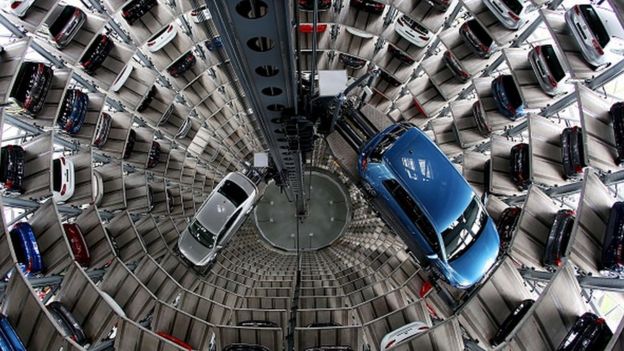Germany economy slows in Q2
Germany’s economic growth slowed in the second quarter, albeit less markedly than had been expected.
Europe’s largest economy expanded by 0.4% between April and June, down from 0.7% in the first quarter, but above forecasts of 0.2% growth.
Exports and consumer spending were stronger than forecast but investment in construction and machinery slowed.
New data also confirmed that GDP growth across the eurozone halved to 0.3% in the second quarter.
Second estimates showed expansion between April and June slowed from 0.6% in the first three months of the year.
GDP also fell across 28-nation European Union from 0.5% in the first quarter to 0.4%.
Commenting on “Europe’s engine room”, Carsten Brzeski, economist at ING-DiBa, warned that Germany must increase investment to support growth.
However, he said it could be hampered by “increased uncertainties after the Brexit vote, continued structural weaknesses in many eurozone countries and a renewed global slowdown”.
Joerg Zeuner, economist at KfW, said: “The decision to leave the EU will hit the British economy, and the slowdown will spread to Germany through muted exports.
“The UK is an important market, especially for German car makers, but also for our chemical and pharmaceutical industries.”
 Image copyrightGETTY IMAGES
Image copyrightGETTY IMAGESSlowing GDP was more pronounced in Italy during the second quarter when its economy failed to grow at all, compared with a 0.3% expansion in the first three months of the year.
Analysts had expected GDP to grow by between 0.1% and 0.3%.
Italy is battling to restructure its banking sector, which is buried under €360bn worth of bad loans. Monte dei Paschi di Siena, Italy’s third largest bank and the world’s oldest lender, is saddled with €46.9bn of bad debt.
Oil prices
New data also revealed that German inflation rose in July, up by 0.4%, fuelled by rising food and services prices.
Inflation was tempered by the falling cost of energy and clothing. Destatis, Germany’s statistics office, said stripping out energy, inflation would have been 1.3% in July.
Since then, oil prices have risen, and on Thursday jumped 4% after Saudi Arabia’s energy minister Khalid al-Falih said Opec, the cartel of oil producing nations, would hold talks about stabilising prices at a meeting next month.
Prices were also buoyed by an International Energy Agency report which said it expected supply and demand balance to tighten towards the end of the year.

